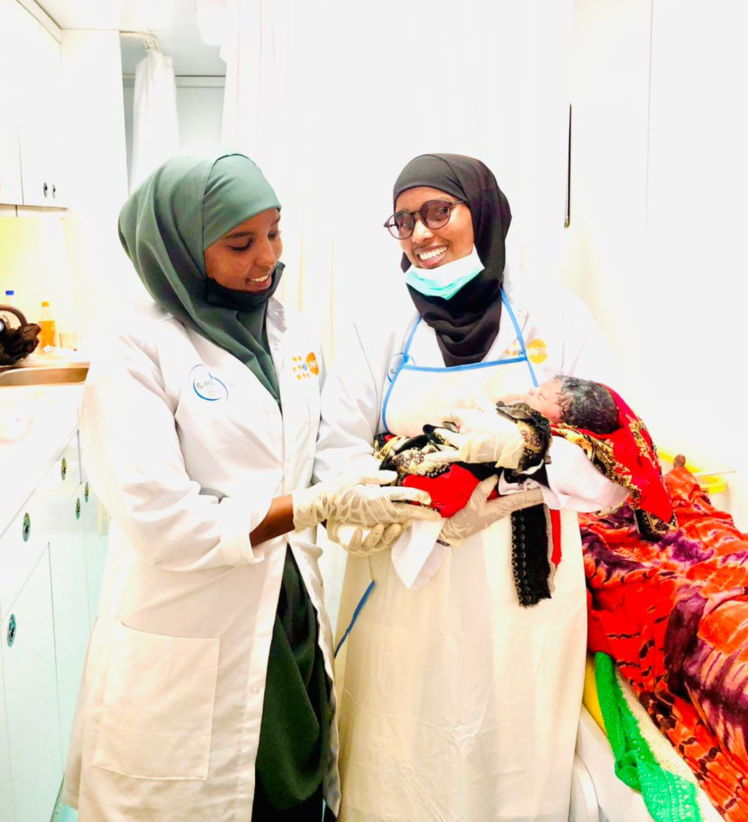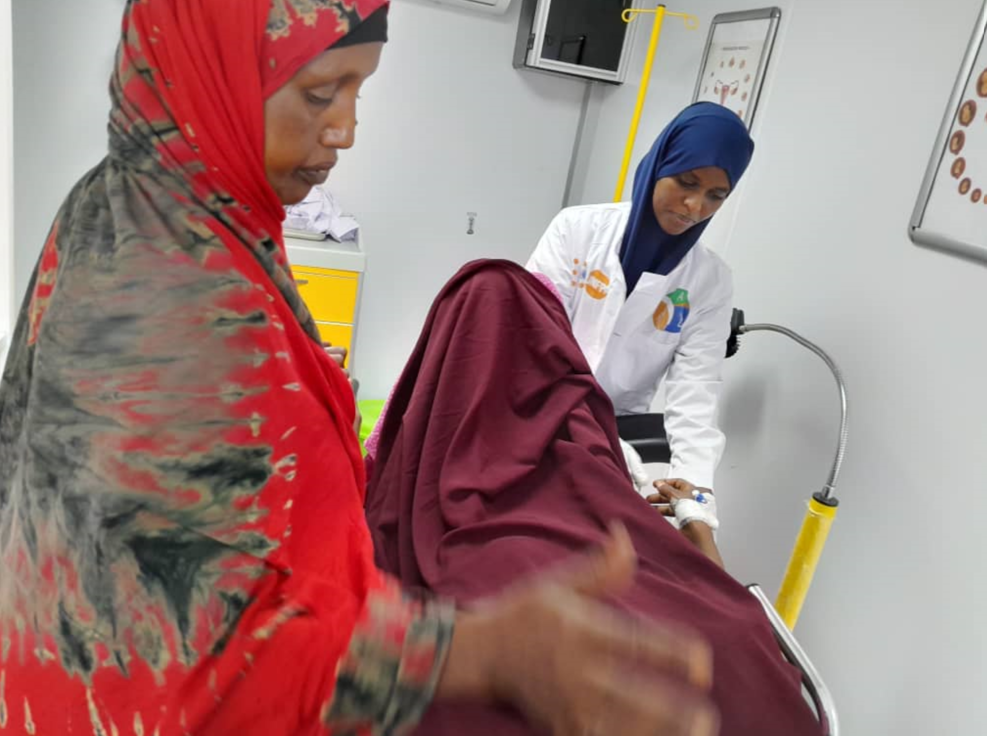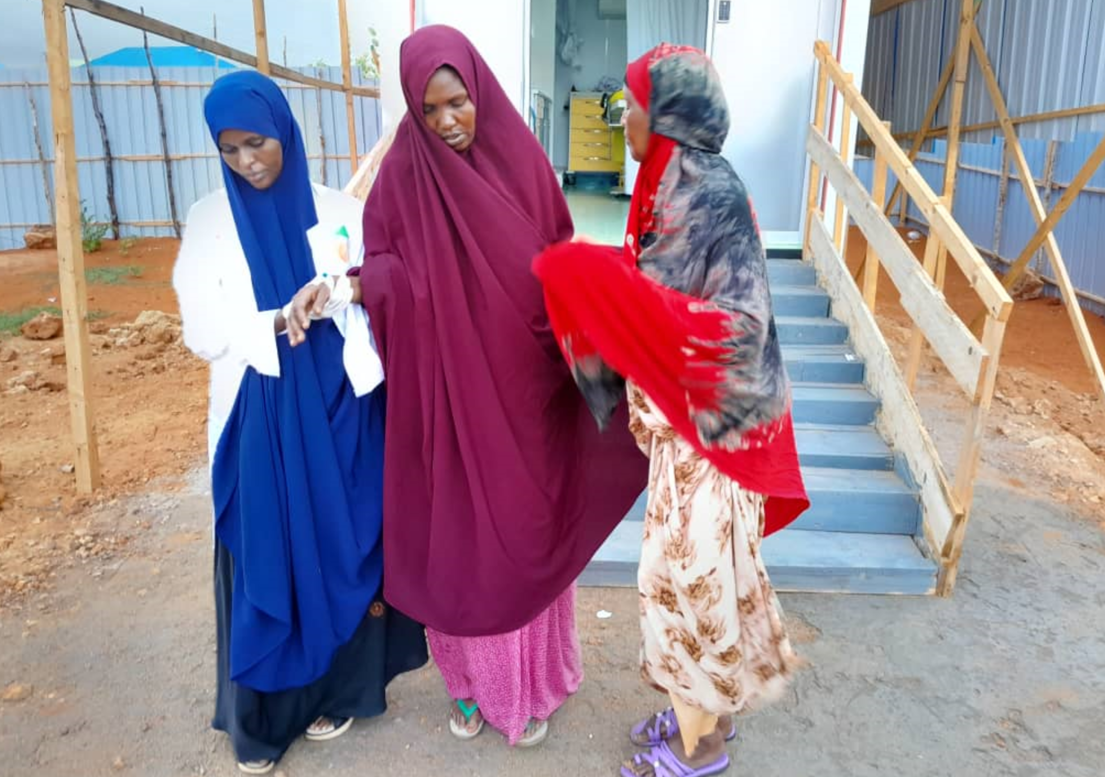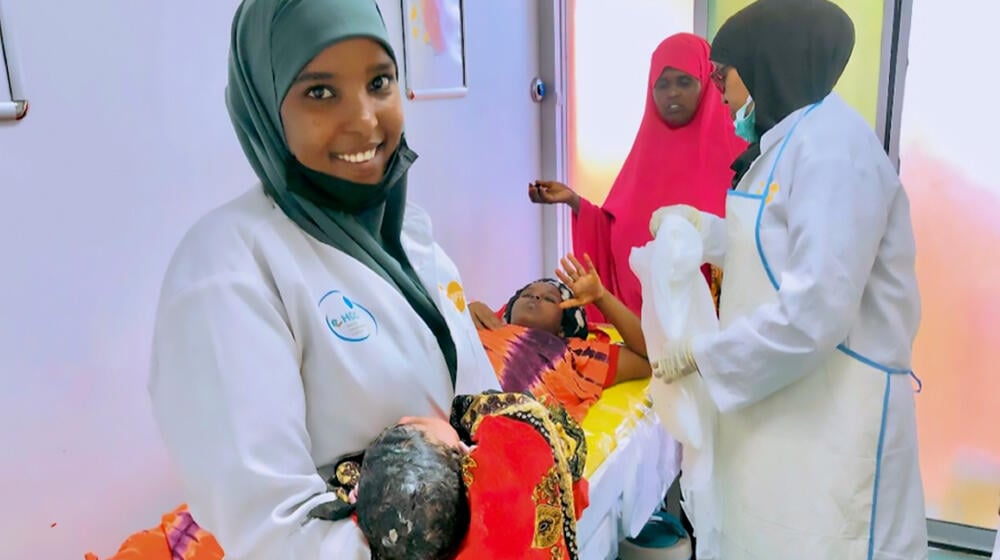In the midst of Somalia’s multifaceted crisis encompassing security, severe drought, hunger, and flooding, displaced women in Somalia face immense challenges, particularly when it comes to accessing reproductive healthcare. Two compelling stories, featuring Abshiro Daqane and Fadumo Bare, shed light on the dire circumstances pregnant women endure in the face of conflict and climate shocks. However, amidst the devastation, a glimmer of hope emerges in the form of the United Nations Population Fund (UNFPA)'s Mobile Maternity Clinics (MMCs). These clinics provide crucial and life-saving services, empowering vulnerable women and ensuring safer childbirth experiences in the midst of the ongoing crisis.
Dollow, Somalia - In the face of a multifaceted crisis encompassing severe drought, hunger, and now flooding, Abshiro Daqane, a resilient 22-year-old internally displaced woman, found herself confronted with greater challenges, just as she prepared to give birth. Residing in the flood-ravaged Gedo Region's Qansahley settlement for internally displaced persons, Abshiro's journey had been fraught with hardships. The heavy rains that pounded the region exacerbated the already dire circumstances, compounding the plight of women and girls in Bardera, Dollow, and Luuq districts within Gedo, especially those who are pregnant or lactating.
The recent floods have left an indelible mark on the region, affecting an estimated 268,365 people. Over 15,000 families, comprising approximately 93,600 individuals, have been displaced from their homes. The Juba River, surpassing high-risk flood levels, has further exacerbated the situation. Among the affected population, 61,724 women of reproductive age find themselves in precarious circumstances. Moreover, there are 8,531 pregnant women, with only a fraction having access to or the ability to deliver in a healthcare facility within the next three months.

Amidst the chaos and uncertainty, Abshiro's hope flickered as she faced the imminent arrival of her child. The flood had engulfed the settlement, leaving her without access to the necessary reproductive healthcare she desperately needed. She had previously given birth in crowded shelters, lacking privacy and sanitation, which had resulted in serious infections and hemorrhaging. Now, with the flood waters rising, she was again facing a similar situation, with overcrowded shelters that lacked privacy, sanitation, and skilled attendants, putting both her and her unborn child at risk of complications.
Yet, a glimmer of hope emerged amidst the devastation, she learnt about the United Nations Population Fund (UNFPA)’s newly established Mobile Maternity Clinic (MMC) in Dollow District. Abshiro arrived at the MMC, becoming the first expectant mother to be admitted since its launch. That evening, she successfully gave birth to a healthy baby girl, while being attended by the trained staff. Expressing her joy, relief and deep gratitude, Abshiro shared, "I'm incredibly grateful to UNFPA for providing us with a mobile facility in the IDP camp, where skilled midwives attend to us." Contrasting her previous experiences in inadequate IDP shelters, the mobile clinic ensured her privacy and minimized the risk of complications and infections.
Kismayo, Somalia - In the midst of a dire drought and hunger crisis, Fadumo Bare, a 35-year-old mother of four, grappled with challenges as she prepared to give birth to her fifth child. Fadumo's journey has been fraught with challenges, starting from her displacement from Gosha, where she and her family were once farmers, forced to abandon their properties and farms due to exorbitant taxes imposed by Alshabaab. Seeking refuge in the Dalxiska IDP settlement in Kismayo, She and her family lived in makeshift structures, struggling to rebuild their lives.
The consequences of long-term conflict and climate shocks have left a staggering 3.8 million Somalis displaced from their homes. Among the most vulnerable are women, who face significant challenges in accessing reproductive healthcare. Startling statistics from the 2023 Humanitarian Needs Overview shed light on the critical gaps, revealing that a staggering 86 percent encounter obstacles when seeking reproductive healthcare services.

In the past, Fadumo gave birth to her three children at home under the care of traditional midwives. However, the situation changed when staff from the UNFPA supported MMC visited her two weeks before her due date. They informed her about the safe delivery services provided at the center. Intrigued, Fadumo visited the clinic, where she received thorough examinations and guidance during her frequent visits in the following weeks leading up to her labor. Fadumo experienced a complication-free delivery, giving birth to a healthy baby girl, without any financial burden. Before leaving the centre she made a promise to spread the word about the MMC, encouraging others to seek its services for safe deliveries.
In the face of Somalia's multifaceted crisis, pregnant women have long suffered from the lack of adequate healthcare. However, the MMCs have brought a ray of hope to these vulnerable women. By providing essential care, skilled attendants, and safe birthing options, they are reshaping the lives of pregnant women, ensuring they can bring their children into the world with dignity and safety. As these clinics continue to expand, they represent a crucial step toward building a healthier and more equitable future for mothers and newborns in Somalia. In addition to Dollow and Kismayo, a clinic is now functional in Mogadishu, and two more set to become operational soon in Baidoa and Beletweyne.

Abshiro and Fadumo's stories stand as a testament to the transformative influence of the UNFPA’s mobile maternity clinics in this complex crisis. From a vulnerable woman at the risk of losing her life during childbirth, they have emerged as empowered mothers who safely delivered with dignity, and became active advocates for safe birth. Their journey showcases the profound difference that UNFPA's intervention can make in the lives of those facing the compounded challenges of drought, hunger, and flooding.



